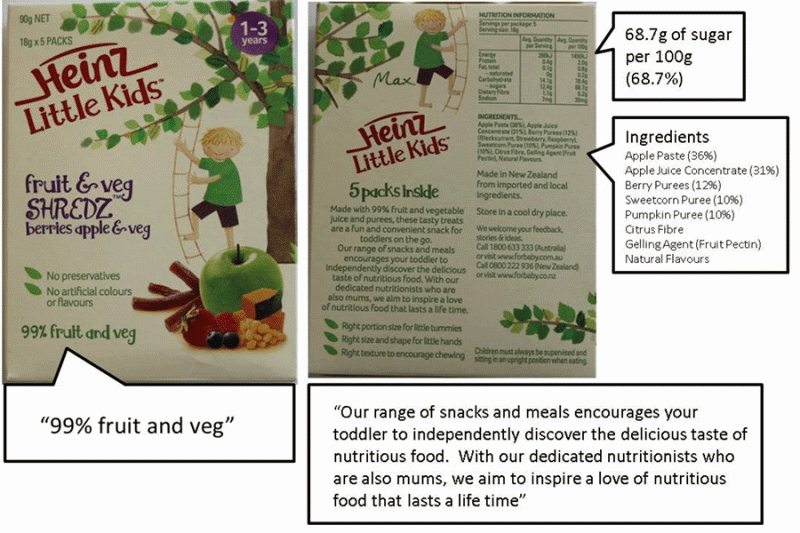The court’s fine fell well short of the $10million deterrent sought by the consumer watchdog.
Heinz was hit with a $2.25 million fine after misleading consumers by claiming its Shredz snack, marketed for toddlers, was beneficial for young children.
The company was also ordered to set up a consumer protection law compliance program and maintain that program for three years.
But Federal Court Justice Richard White in his judgement said Heinz had no record of any prior contraventions, which “is to its credit, especially given the large number of products it markets”.
Justice White said the ACCC’s submission “that Heinz’s conduct was ‘egregious’ involves a degree of overreach”.
“The elements of flagrancy, deliberate exploitation of the vulnerable, ruthlessness or indifference which are seen in some matters which come before the Court, and which do warrant the epithet ‘egregious’, are not present in this case.
“Heinz’s contraventions of s 29(1)(g) are to be viewed seriously but not with the additional characterisation for which the ACCC contended.”
The Shredz products were a dehydrated snack made from 99 per cent fruit and vegetable ingredients and did not contain any preservatives, artificial colours or flavours but had a high sugar content.
The court found prominent statements on the packaging conjured impressions of nutritiousness and health.
More than one million were sold before the products were pulled from shelves in May 2016.
“I am satisfied that each of the Heinz nutritionists ought to have known that a representation that a product containing approximately two-thirds sugar was beneficial to the health of children aged one to three years was misleading,” Justice White said.

Justice White rejected the ACCC’s submission that Heinz has a corporate culture marked by a lack of concern for compliance.
“Instead, the evidence suggests that the contraventions occurred by reason of Heinz’s failure to appreciate that the Healthy Foods Representations were conveyed by its packaging and that those representations were, in respect of each product, false or misleading,” he said.
Interestingly and with possible effect on future prosecutions, Justice White also rejected ACCC submissions emphasising the size of Heinz, its membership of the global Kraft Heinz Food Company, and its capacity to pay a substantial penalty.
“The size of a contravener is a relevant matter to the imposition of penalties, although it is not a reason, by itself, for the imposition of a higher penalty than would otherwise be appropriate,” Justice White said.
The ACCC wants corporate fines upped from $10 million to $100 million specifically to hurt large companies, because it argues they can easily cop smaller fines as simply a potential cost, an acceptable risk, of doing business
But Justice White rejected that Heinz had regarded the possible imposition of sanctions with respect to its marketing of the Shredz products as a cost of doing business.
Heinz provided evidence to the court of its financial position as at 31 December 2016.
Revenue from continuing profit $448,255,000
Total comprehensive profit $31,415,000
Total assets $701,843,000
Heinz at an earlier hearing had asked for a fine of $400,000, saying $10 million would be oppressive.
Justice White said in 2016 Heinz achieved global net sales of $US26.5 billion in 40 countries.
The submission made on behalf of Heinz that the penalty of $10 million sought by the ACCC would be oppressive to it cannot be accepted, he said.
Australian Competition and Consumer Commission
Justice White refused requests from the Australian Competition and Consumer Commission to have Heinz publish corrections to its misleading material.
ACCC chair Rod Sims said the organisation would continue to advocate for stronger penalties to deter large companies from contravening consumer laws.
“The ACCC wants to ensure that penalties for breaches of the consumer law are large enough to get the attention of the financial markets, boards and senior management,” Ms Sims said.
Heinz said it “respects the decision that has been made” in regard to penalty.
It said the company remained committed to providing high-quality food products to consumers.
The Obesity Policy Coalition in 2015 made the initial complaint about Shredz to the ACCC.
Coalition executive manager Jane Martin said some food companies continue to misrepresent their products as the healthy option for children.
“Clearly labelling ‘added sugar’ on the packaging will help parents cut through the marketing spin when they’re choosing healthy snacks for their children,” Ms Martin said.
She said the coalition wants to see the Health Star Rating System recognise that sugar sourced from fruit is still sugar, and rate products accordingly.
The World Health Organization recommends limiting foods containing added sugar, including fruit juice concentrate, to 10 per cent of a person’s daily energy intake, and ideally no more than 5 per cent (or 6 teaspoons per day) for the biggest health benefit.
Source: www.ausfoodnews.com.au







